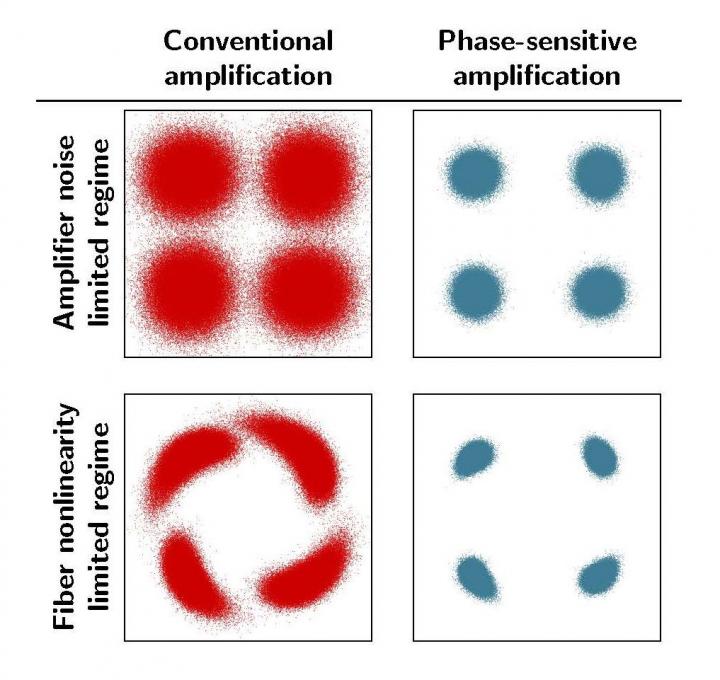Fiber-optic transmission of 4,000 km made possible by ultra-low-noise optical amplifiers

Signal constellation diagrams comparing conventional amplification and phase-sensitive amplification in an amplifier noise limited regime (-2 dBm launch power) and a fibre nonlinearity limited regime (8 dBm launch power). Credit: Samuel Olsson
Video streaming, cloud storage and other online services have created an insatiable demand for higher transmission capacity. To meet this demand, new technologies capable of significant improvements over existing solutions are being explored worldwide.
The reach and capacity in today's fibre optical transmission links are both limited by the accumulation of noise, originating from optical amplifiers in the link, and by the signal distortion from nonlinear effects in the transmission fibre.
In this ground-breaking demonstration, the researchers showed that the use of phase-sensitive amplifiers can significantly, and simultaneously, reduce the impact of both of these effects.
“While there remain several engineering challenges before these results can be implemented commercially, the results show, for the first time, in a very clear way, the great benefits of using these amplifiers in optical communication”, says Professor Peter Andrekson, who leads the research on optical communication at Chalmers University of Technology.
The amplifiers can provide a very significant reach improvement over conventional approaches, and could potentially improve the performance of future fibre-optical communication systems.
“Such amplifiers may also find applications in quantum informatics and related fields, where generation and processing of quantum states are of interest, as well as in spectroscopy or any other application which could benefit from ultra-low-noise amplification”, says Professor Peter Andrekson.
###
The research has been funded by the European Research Council (ERC), the Swedish Research Council, and the Wallenberg Foundation.
Media Contact
All latest news from the category: Information Technology
Here you can find a summary of innovations in the fields of information and data processing and up-to-date developments on IT equipment and hardware.
This area covers topics such as IT services, IT architectures, IT management and telecommunications.
Newest articles

First-of-its-kind study uses remote sensing to monitor plastic debris in rivers and lakes
Remote sensing creates a cost-effective solution to monitoring plastic pollution. A first-of-its-kind study from researchers at the University of Minnesota Twin Cities shows how remote sensing can help monitor and…

Laser-based artificial neuron mimics nerve cell functions at lightning speed
With a processing speed a billion times faster than nature, chip-based laser neuron could help advance AI tasks such as pattern recognition and sequence prediction. Researchers have developed a laser-based…

Optimising the processing of plastic waste
Just one look in the yellow bin reveals a colourful jumble of different types of plastic. However, the purer and more uniform plastic waste is, the easier it is to…



